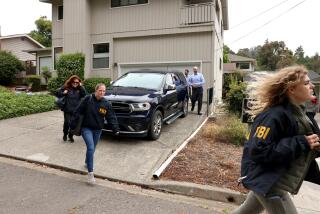City Reacts to 1st Signs of Trouble in Campaigns
- Share via
THOUSAND OAKS — In a city known for sign ordinances restricting everything from yard-sale notices to restaurant marquees, candidates for public office are expected to toe the line like everyone else--or else.
In fact, political hopefuls from the City Council to the U.S. Congress must comply with city laws enacted to prevent Thousand Oaks from looking like a sensory overload disaster zone every election season.
Already, three City Council hopefuls and one congressional candidate have failed to live up to the rules. The city clerk’s office has sent warning letters to council candidates Dan Del Campo, Tom Lee and Nick E. Quidwai, asking them to take down illegal or unauthorized signs.
And the city’s Code Compliance Office has sent a letter to Richard Sybert, the Republican candidate in the 24th Congressional District race, notifying him that some of his signs are in violation of city rules and must be taken down by today, or he will have to pay the city’s cost of removing them.
“People are fairly aware in Thousand Oaks of what is legal and what is not,” said Betty Gust, the city’s code compliance officer in charge of monitoring political signs. “And if they see something illegal, they let us know.”
Some political activists believe Thousand Oaks’ clampdown is a bit much.
Dave Anderson, Del Campo’s campaign manager, acknowledged that his candidate did not ask all property owners before placing signs on their property, a violation of the city ordinance. But he said those who object can simply yank them out and throw them away.
“I think everyone puts up signs all over the place,” said Anderson, who erected many of Del Campo’s signs himself. “We are not aware of anyone who feels our signs are not appropriate. And if they do, what is the big deal? Whoever feels our signs are not appropriate can take them down.”
Anderson said the sign restrictions favor more development-friendly candidates, arguing that they are more likely to secure approval from property owners to put up their notices.
Nine candidates are vying for two seats on the council. Incumbent Mike Markey is seeking reelection. The other seat, vacated by former Councilwoman Jaime Zukowski when she resigned to move to Colorado, is open.
“The only people that can get their signs put up everywhere are the pro-development people like Markey,” Anderson said. “You see them in every strip mall.”
John Theiss, Sybert’s campaign director, said some of his candidate’s signs were not properly placed because he hired a private firm to put them up throughout the city, and the company was not aware of some of the rules. He said the illegal signs are being taken down.
Theiss also stressed that any signs placed on private property were put there with the landowner’s permission. The city’s letter to Sybert said that some property owners had complained they were not asked. Sybert is running against Democrat Brad Sherman in the race for the 24th Congressional District, which also includes Calabasas and some of the western San Fernando Valley.
“The worst thing you could do is to put a sign on their land if they don’t want it there,” Theiss said. “We would never do that. We are overwhelmed with calls from people saying that they would like to put up a Sybert sign. We have a great demand for that.”
Thousand Oaks gives all City Council candidates a list of the city’s rules restricting political signs, and asks them to sign a statement acknowledging they know the law.
Quidwai said he either asks landowners personally whether he can put a sign on their property, or he sends them a fax asking for permission. He said he has only received a handful of complaints about his signs, and only one from a homeowner. That incident was an honest mistake by one of his campaign aides, who believed he was placing the sign on public property, he said.
“He did not realize it was an extension of the person’s yard,” Quidwai said. “I left a note at the house, telling them I was sorry.”
The problem, Quidwai believes, is that it is hard to find out which signs fail to meet Thousand Oaks’ rules because the city protects the identities of those who complain. Another problem, he said, is that some candidates just look for others’ signs, and place theirs at the same spot without asking for permission.
“Some of these areas are kind of gray,” he said. “One of the unwritten rules is that people see one or two signs, and [then] they put their signs there. That’s not the way to do it.”
More to Read
Sign up for Essential California
The most important California stories and recommendations in your inbox every morning.
You may occasionally receive promotional content from the Los Angeles Times.










